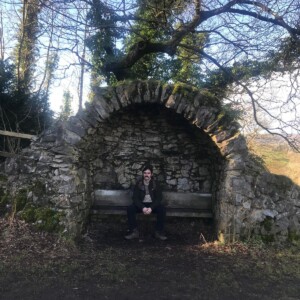
Sam Bright
University of Leicester
Project
Orogenic granites: Windows into Caledonian crustal evolution
Supervisors
- Marc Reichow
- Andrew Miles
- Iain Neill
- Mike Searle
PhD Summary
I work on granite plutons in the Scottish Highlands, using a mixture of geochronological, geochemical and structural data to understand the genesis, evolution and emplacement of a select few plutons close to the Great Glen Fault. Specifically, I want to understand their relationship to the Great Glen, and use this to answer broader questions about mountain building processes: was the emplacement of these granites controlled in some way by the fault? Can we use these granites to estimate the total magnitude of movement along the Great Glen Fault during the climax of the Caledonian Orogeny (Scotland’s last great mountain building event)? What is the significance of this fault – is the crust on one side of it (the Northern Highlands) completely different in origin to the other side (the Grampian Highlands)? These all tie into larger questions about how granites are formed and emplaced, and how large blocks of the Earth’s crust are deformed and shifted during episodes of continental collision.
Previous activity
I got into geology during my childhood, growing up in Dorset with the Jurassic Coast a stone’s throw away. My four-year degree at University College London exposed me to the possibilities of research in a variety of areas within geoscience, and by the end of my time there I figured if I was going to do research it would have to be studying one of the two things that excited me the most: fossils, or igneous rocks. I took a year off to help me decide further, and after two month-long stints in Iceland, including seeing the active volcano there, I definitely found myself leaning towards second of those things.
Why did you choose doctoral research?
I think no matter what I ended up doing in life, I always wanted to do something that was a) so enjoyable I barely noticed it was a job, and b) something that would, directly or indirectly, help people and society in some way. So the idea of research in geology was very appealing to me: I get to study and discover all these interesting things, travel, get out into nature, and get paid for it?! Obviously, this is quite an idealistic view, and a PhD isn’t always smooth sailing – but I think that kind of idealism does someone no harm when committing to research for four years!
Why did you choose CENTA?
Central England was definitely one part of the UK I always wanted to spend more time in, with its deep intertwining between history and geology (where else could the Industrial Revolution have kicked off?). The application process for CENTA was very friendly, with accommodations made for my low-income background. I got the sense that the selection process had a lot of thought put into it, and felt the most confident during the interview of all the PhDs I applied for.
Future plans
My project holds what I believe to be the best mix of lab-based techniques and good honest fieldwork, with Scotland being pretty accessible as far as field areas go. That variety gives me a good array of options for when I finish – I like the idea of continuing with my research, perhaps in a postdoctoral role, but otherwise I’ve realised that I’m happiest working outside when possible. So ultimately, I’d like a career that would allow me to utilise the skills, knowledge and experience I’ve gained in studying, conserving and teaching about the rich geology and landscapes this country has to offer.
